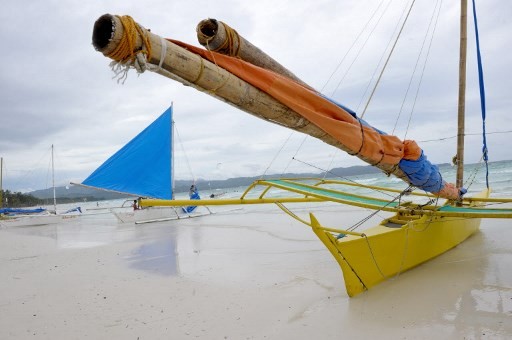Popular Reads
Top Results
Can't find what you're looking for?
View all search resultsPopular Reads
Top Results
Can't find what you're looking for?
View all search resultsOptimizing Indonesia‘s economic diplomacy
Change text size
Gift Premium Articles
to Anyone
 Sailboats are anchored at the fabled beach of Boracay Island, Philippines, on Nov. 9, 2008. The government in Manila rejected allegations on Nov. 11, 2008, that it was grabbing land from international investors on the island, saying accounts of resorts being forcibly seized were being exaggerated. Environment Secretary Lito Atienza said the accounts were merely a land dispute between two parties. (AFP/Jay Directo)
Sailboats are anchored at the fabled beach of Boracay Island, Philippines, on Nov. 9, 2008. The government in Manila rejected allegations on Nov. 11, 2008, that it was grabbing land from international investors on the island, saying accounts of resorts being forcibly seized were being exaggerated. Environment Secretary Lito Atienza said the accounts were merely a land dispute between two parties. (AFP/Jay Directo)
O
ne of the main priorities of Indonesia's foreign policy today is economic diplomacy and its objective is to increase the value of trade and investment, which will eventually increase Indonesia's economic growth.
In its efforts to achieve that objective, the government has adopted a market access expansion policy by way of concluding economic treaties with other states. The most recent outcome of this policy is the Comprehensive Economic Partnership Agreement between Indonesia and Australia, which took effect on July 5.
This economic diplomacy is something that should be supported by the Indonesian people as an effort to improve the national economy, and it is also very relevant in the current situation, considering the impact of the COVID-19 pandemic that has disrupted the growth of the world economy, including Indonesia.
However, from the perspective of international law, there is one important issue in concluding economic treaties that should be carefully considered in order to ensure the objective of the economic diplomacy mentioned above can be optimally achieved. This important issue relates to dispute resolution.
As a subject of international law and party to the economic treaties, the Indonesian government should be aware of and anticipate any potential economic disputes related to the agreed commitments.
This could be done by ensuring that all of its economic policies are in accordance with its legal commitments in the economic treaties. Furthermore, another crucial thing is keeping up with developments in economic dispute resolution.
There are two important matters to pay attention to in this regard.
First, one must understand the current nature of the economic dispute settlement system. At present, investor state dispute settlement (ISDS) is an economic dispute resolution mechanism that is very relevant to be understood. This system comes into play when an economic treaty covers investment issues.
The ISDS is a dispute resolution system that provides an opportunity for foreign investors to claim material compensation directly from a state where their investment has been made because the state is considered to have violated its legal commitment.
The ISDS system is created with the aim of providing a guarantee of protection to investors so as to attract the interest of these investors to make investment in foreign states. Nevertheless, it is important to understand that, under the ISDS system, states are only respondents. That means that states have no other option except to prove that they do not violate their commitments. The only advantage of winning an ISDS case is to be spared from a claim of large compensation. There is no mechanism for states to seek remedies from investors. In other words, winning an ISDS case does not bring any benefit to the state after spending a large amount of money and other resources on the litigation process.
Therefore, having understood this ISDS system, the Indonesian government could make a better and comprehensive costs and benefit analysis before implementing an economic policy that has the potential to violate its commitments in the treaties concluded.
Second, after understanding the current nature of the economic dispute settlement system, the government needs to continue its active participation in negotiations about ISDS reform.
The existence of the ISDS system is actually detrimental to states, because in the end states have to deal with a number of investments disputes. For example, from 2011 to 2015, the government was one of the states that had a high exposure to the ISDS system through five investment dispute cases with a value of billions of US dollars. This situation has led states to believe they have lost their power to regulate matters related to public concern and even to implement policies that are in line with their constitution.
To address this issue, states are currently trying to discuss possible ISDS reforms in various international forums, including the United Nations Commission on International Trade Law (UNCITRAL). The meetings of UNCITRAL discussing ISDS reform are held regularly in New York and Vienna. Indonesia needs to continue its participation in these discussions.
The writer is a diplomat at the Permanent Mission of Indonesia to the UN organizations, including UNCITRAL in Vienna.









